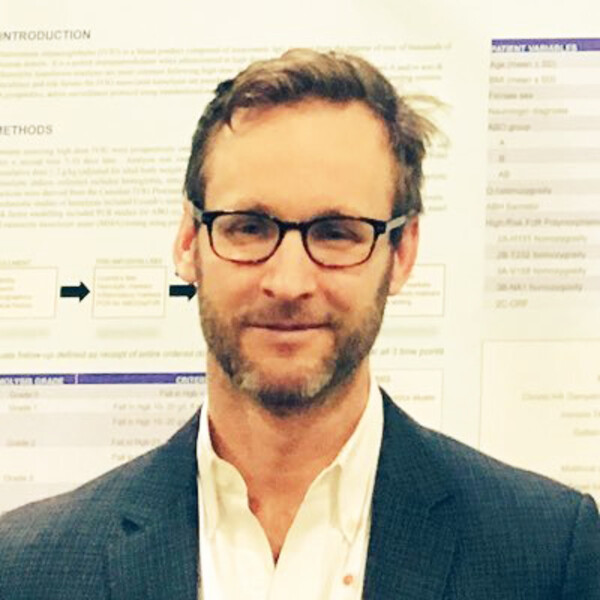Breadcrumbs
Promotions 2021: Q&A with Jacob Pendergrast

This year, we celebrate a record 12 promotions in the Department of Laboratory Medicine and Pathobiology.
We speak to each of them to learn more about their role and what this promotion means to them.
Dr. Jacob Pendergrast has been promoted to Associate Professor.
What is your role in LMP?
Along with my colleagues Christine Cserti-Gazdewich and Lani Lieberman, I serve as a Clinician-Teacher and Associate Medical Director of the University Health Network’s Blood Transfusion Service.
I always prefer to use this term rather than blood transfusion laboratory or blood bank because I see our role as much larger than simply storing and preparing blood products; we are also clinical consultants to our hospital’s myriad medical and surgical programs, and actively participate in the care of their patients.
I have a special interest in the transfusion support of patients with hemoglobinopathies (ie., thalassemia and sickle cell disease) and in fact maintain a small clinical practice at the Toronto General Hospital’s Red Blood Cell Disorders Program, allowing me to provide true “bench-to-bedside” clinical care.
Moving back and forth between these two worlds – the laboratory and the clinic – provides abundant opportunity for teaching and research, and I am lucky to be able to pursue both through my involvement with the QUEST research collaborative, a group of transfusion medicine specialists and basic scientists affiliated with the University of Toronto.
Why did you pursue an academic career?
I genuinely love to teach, but the truth is, my affiliation with the University of Toronto is more a reflection of how much I love to be taught.
Becoming a specialist in transfusion medicine required seven years of post-graduate medical training (in my case, three years of core internal medicine, two in adult hematology, and another two in transfusion medicine). All those years of study were at U of T, and the reason I kept signing up for more instead of just going out and starting a practice at the first opportunity was because the subject matter was so interesting and my instructors were so consistently outstanding.
By the time I had exhausted all my available post-graduate educational funding, I was so specialized it would actually have been difficult to find a job outside of an academic setting. But I love being a part of U of T’s Faculty of Medicine, and it is hard for me to imagine working anywhere else.
I am grateful for the opportunities I have in my current position to provide support to community, rural and remote hospitals, and regularly find inspiration in those settings, but the academic environment is where I feel most at home.
What does this promotion mean to you?
I waited a long time before seeking academic promotion and I will be the first to admit I didn’t initially appreciate what the point was – there are no material perks that come from moving from Assistant to Associate Professor, and I knew that the process of assembling my dossier would be difficult and time-consuming.
I had always found sufficient satisfaction in simply doing the teaching, research, and creative professional activities that come with my position, and I was only motivated to start documenting it all for the purpose of academic promotion when I realized that doing so might better my chances in securing research funding.
Once I started down the path, I discovered that the process of seeking academic promotion is truly its own reward: looking back, sorting through, and organizing my files, revealed themes and patterns within my career that I hadn’t been aware of before. I found new meaning and purpose in what I had done to date, and a greater sense of where I wanted to go next. Actually being promoted – being told that I had met the high standard set by the University of Toronto – was of course also very affirming, and a satisfying end to the trek.
If you could go back, what advice would you give your younger self?
Learn what the rules of academic promotion are and then, starting on day 1, begin documenting your work and updating your CV. It doesn't have to be perfect - even the crudest filing system is better than nothing – but it should be as comprehensive as possible. All that supporting evidence, especially when digital, is easily lost over time and can be hard to track down later.
What advice would you give faculty who would like to apply for promotion?
Talk to someone whose career resembles yours, and who has already been successful in their application, and get as much advice from them as you can. If they’re willing, read over their own promotion dossier.
Then take your time putting your own dossier together: give yourself at least 6 months so you have time not just to assemble your documentation and identify your references, but to think about and revise your personal statements.
How did you manage your time in putting your dossier together considering your multiple priorities?
I knew that the further along in the process I got the more mentally fatigued I would become, so I tried to do the cognitive heavy lifting – articulating my research and teaching philosophies – early, saving the more mechanical work like adding up grants and publications for the end.
I also scheduled regular time each week to work on it, rather than trying to squeeze it in between all my various other tasks. Even still, there were a few late nights near the end as the submission deadline was suddenly imminent.
Find out more about promotion
Promotion guidelines: to Associate Professor and Professor
Contact lmp.hr@utoronto.ca if you are a faculty member in LMP and want to learn more about the promotion process, workshops, and more.
